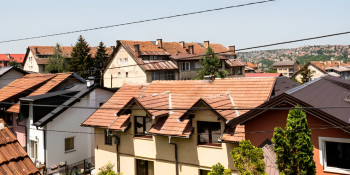
Building capacity to create a strong foundation for future generations
“We used to have very small apartments,” Alma Mushi, deputy marketing director for Fondi BESA, Albania’s largest microfinance institution, reflects on the nation’s past. Her recollections of the Communist era from 1944 to 1991 paint a vivid picture of cramped living conditions where families, like hers, were squeezed into tiny spaces - “eight or nine people living in two rooms and one kitchen.”
In the past 30 years, Albania’s housing stock has grown by 58%. But affordable housing supply still lags significantly behind demand, and there remains a deficit of 100,000 housing units.
Valbona Xhafa, regional manager at Fondi BESA, emphasizes the deep cultural value placed on homeownership in Albania: “We Albanians are very sensitive about our houses. We all want to own houses. That’s what it means to live well.”
Recognizing the widespread desire for improved living conditions in Albania, Fondi BESA, with support from Habitat for Humanity’s MicroBuild Fund, introduced a new housing loan product in 2021. This initiative faced initial challenges, as Alma from Fondi BESA notes: “We’d had the product for more than a year, but we were hardly disbursing any housing loans.”
The pandemic and the similarity of this new product to existing loans were significant barriers. However, MicroBuild’s technical assistance, focusing on product differentiation and staff training, marked a turning point. “It makes me happy that now we can serve these clients with better loan terms,” Valbona remarks.
Valbona at her desk in Fondi BESA’s head office.
In a small village on the outskirts of Tirana, the capital, we encounter the tangible impact of these efforts in the life of Mereme’s family. When Jersika, a loan officer at Fondi BESA, visits her client Ergil, Mereme, his mother, insists on a unique ritual: rubbing her foot across the doorsteps. Doing this, Mereme says, will help Ergil find a wife faster. This small act reflects Mereme’s deep desire to see her son settle down and start a family.
Mereme and her husband, Bashkim, live in a modest, three-room structure surrounded by smallholder farms. In stark contrast, adjacent to their home is Ergil’s new house, a testament to modern architecture with its clean, whitewashed walls and a freshly laid tile patio. This new structure symbolizes a significant shift from the family’s humble beginnings.
Fondi BESA loan officer
The family initiated the house construction four years ago but faced financial constraints, buying materials only as funds allowed. When Jersika first met them six months prior, the house was incomplete, more a shell than a home. “I saw their house was still incomplete, and I went to talk to them,” Jersika recounts. Her intervention, through Fondi BESA’s housing loan pilot, was timely. “The loan helped us speed up the building process,” Mereme confirms, detailing how they could swiftly purchase doors, windows, and a roof.
Jersika and Fondi BESA didn’t stop at just providing financial assistance. They worked closely with Ergil, advising on energy-efficient materials and construction techniques. This guidance included insulating the roof and walls, significantly reducing the family’s energy usage and costs. The benefits were felt immediately.
“Even without air conditioning, when daily temperatures routinely surpassed 90 degrees Fahrenheit, it was consistently 15-20 degrees cooler inside the house,”— Mereme
The family’s aspirations for Ergil’s home extend further. “The foundation was built to support two stories,” Jersika explains, highlighting the potential for future expansion. Mereme, with optimism and a touch of humor, adds, “Yes, with our next loan, we might even add a second story.”
In this evolving narrative, the story of Mereme’s family is a microcosm of Albania’s journey towards improved housing. It exemplifies the transformative power of dedicated support and the enduring spirit of families adapting to and shaping their futures.